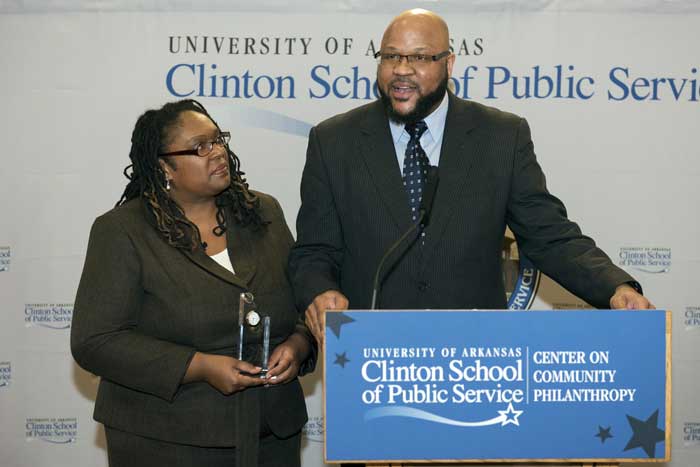UA Little Rock racial disparities research project earns Community Philanthropy Advancing Equity Award
The University of Arkansas at Little Rock Racial Disparities in the Arkansas Criminal Justice System Research Project has been selected as one of the Community Philanthropy Advancing Equity Award recipients.
The University of Arkansas Clinton School of Public Service Center on Community Philanthropy presented the awards Jan. 23 as part of its National Day of Healing celebration. This award is given to organizations that are using innovative solutions to address racial inequalities in their communities and advance progress toward inclusion.
“We are pleased to be a part of this project,” Bowen Dean John DiPippa said. “Bowen’s core values of access to justice, public service, and professionalism, require us to help bridge the gap between the criminal justice system and all Arkansans.”
The research project, ran through the UA Little Rock William H. Bowen School of Law, seeks to reduce racial disparities and combat implicit racial bias in the criminal justice system through outreach and education.
It began in 2011 under the leadership of Adjoa Aiyetoro, the inaugural director of the UA Little Rock Institute on Race and Ethnicity, and Dr. Charles Montague, director of eLearning & Scholarly Technology & Resources and professor of Criminal Justice. More than 70 people from throughout the state make up the project’s steering committee.
UA Little Rock also received a $5,000 stipend, which will be used to continue outreach and education efforts and to develop concrete strategies for combating implicit racial bias in the trial process.
“The project is honored to be named a recipient of the Advancing Equity Award,” said Anastasia Boles, Bowen law school professor and member of the project’s steering committee. “We are especially excited to be a part of the important and continuing work the Center on Community Philanthropy is doing to advance racial equality in Arkansas and beyond.”
Arkansas’s population is only 15 percent African American, yet African Americans make up 42 percent of the state’s prison population. In its initial research, the project sought to determine whether race was a driving factor in this disparity or whether there was another explanation. In 2015, the project released its finding that race is a determining factor in the charge and sentence a defendant will receive.
Since its inception, the project has placed high importance on community guidance and outreach. It has hosted two conferences and at least 16 community forums throughout the state. In addition to sharing the message, these forums have also served as a way to collect stories from community members regarding how racial disparities in the criminal justice system have impacted their lives and the lives of their families.
The project has also completed outreach to groups working in the criminal justice system, with presentations to public defenders, prosecutors, judges and bar associations. Continuing outreach efforts are focused on training and education on the topic of implicit racial bias.
Additional recipients of the Community Philanthropy Advancing Equity Award include Immigration Arkansas, Inc., an organization with the goal to end racial division due to cultural and language barriers and misinformation in the community, and Give Us the Ballot, an educational platform designed around the civic theme of voting, particularly focused on youth.
In the upper right photo, Anastasia Boles, assistant professor of William H. Bowen School of Law, and Malik Saafir, president and founder of Janus Institute For Justice, accept the Clinton School Center on Community Philanthropy Advancing Equity Award on behalf of the UA Little Rock Racial Disparities in the Arkansas Criminal Justice System Research Project. Photo by Lonnie Timmons III/UA Little Rock Communications.
